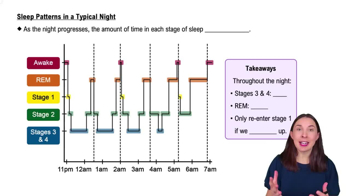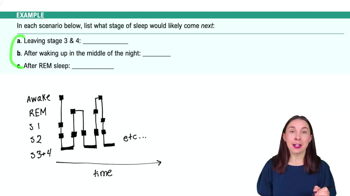Table of contents
- 1. Introduction to Psychology1h 43m
- 2. Psychology Research2h 20m
- 3. Biological Psychology2h 41m
- 4. Sensation and Perception28m
- 5. Consciousness and Sleep32m
- 6. Learning41m
- 7. Memory34m
- 8. Cognition37m
- 9. Emotion and Motivation35m
- 10. Developmental Psychology33m
- 11. Personality48m
- 12. Social Psychology41m
- 13. Stress and Health41m
- 14. Psychological Disorders44m
- 15. Treatment47m
5. Consciousness and Sleep
Sleep
Struggling with Psychology?
Join thousands of students who trust us to help them ace their exams!Watch the first videoMultiple Choice
Pieter was lying on the couch and had fallen asleep when all of a sudden his body jerked, and he woke up because he felt like he was falling. Pieter was most likely in which stage of sleep?
A
N1
B
N2
C
N3
D
REM
 Verified step by step guidance
Verified step by step guidance1
Understand the context: Pieter experienced a sudden body jerk and a sensation of falling while asleep. This is a common occurrence during a specific stage of sleep.
Identify the phenomenon: The sensation of falling and the body jerk are known as 'hypnic jerks' or 'sleep starts.' These typically occur during the transition from wakefulness to sleep.
Review sleep stages: Sleep is divided into several stages, including N1 (light sleep), N2 (moderate sleep), N3 (deep sleep), and REM (rapid eye movement sleep).
Focus on N1 stage: Hypnic jerks are most commonly associated with the N1 stage of sleep, which is the lightest stage and occurs right after falling asleep.
Conclude the analysis: Given the description of Pieter's experience, it is most likely that he was in the N1 stage of sleep when he experienced the sensation of falling and the body jerk.

 3:25m
3:25mWatch next
Master Circadian Rhythms with a bite sized video explanation from Hannah Gordils
Start learningRelated Videos
Related Practice


































































































![Race, Genes and IQ Differences | Bret Weinstein [Mini Clip]](https://img.youtube.com/vi/IztL_m3pd70/mqdefault.jpg)



































































































